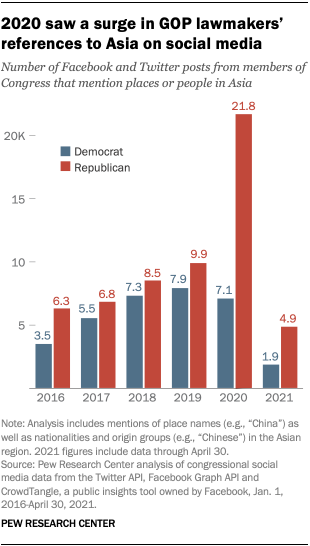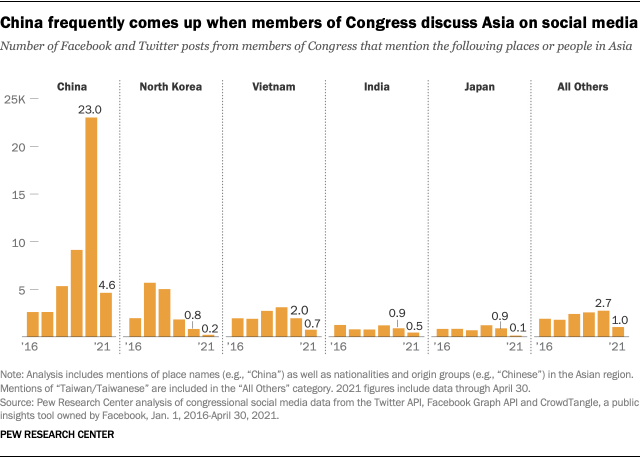Democratic lawmakers have produced the vast majority of congressional social media posts that mention Asian Americans in recent years, according to a recent Pew Research Center study. But Republican lawmakers have produced three-quarters of recent posts that mention places and people in Asia, according to a new analysis by the Center. This focus by GOP lawmakers is a relatively new phenomenon and is driven primarily by discussions of China.
From 2016 through 2019, Republican members of Congress produced a modestly larger number of Facebook and Twitter posts mentioning places and people in Asia than their Democratic counterparts. But in 2020, Republican lawmakers produced more than 21,000 such posts – three times as many as congressional Democrats. And in the first four months of 2021, GOP lawmakers produced more than twice as many such posts as Democrats.
The specific Asian places and people that are mentioned in lawmakers’ social media posts have also evolved in recent years. In 2017 – a period that included a series of meetings and negotiations between the United States, South Korea and North Korea about denuclearization efforts – lawmakers’ posts mentioned North Korea or North Koreans more frequently than any other Asian places or people.
This analysis examines how often – and in what context – lawmakers mentioned Asian places and people in their public-facing communications on Facebook and Twitter. To conduct this analysis, Pew Research Center collected every Facebook post and tweet created by every voting member of Congress between Jan. 1, 2016, and April 30, 2021. The analysis includes lawmakers’ official, campaign and personal accounts.
Researchers then identified posts that directly mentioned Asian place names (e.g., “China” or “Vietnam”) and people (e.g., “Chinese” or “Vietnamese”), while excluding any posts referencing Asian American origin groups (e.g., “Chinese American” or “Vietnamese American”). The countries and groups examined in this analysis are drawn from the Asian American origin groups reported in the U.S. Census Bureau’s American Community Survey. This list includes names and people from 19 Asian nations, one self-governing territory (Taiwan) and one ethnic group not associated with a specific country (Hmong).
Read the methodology for more on how this analysis was conducted, including the full list of country names examined.
But starting in 2018, lawmakers began to mention China more than any other Asian country. And from the beginning of 2020 through the end of April 2021, the 27,611 congressional Facebook and Twitter posts that mentioned China or the Chinese people far surpassed the number of posts mentioning all other places in Asia combined. In fact, posts mentioning China made up nearly 2% of all social media posts produced by members of Congress during that time.
Since 2020, a similar share of members of each party (97% of Democratic lawmakers and 98% of Republicans) have produced at least one post mentioning places or people in Asia. But GOP lawmakers have produced a much larger volume of such posts than Democrats.
This difference arises from a relatively small number of highly active Republican lawmakers who have produced the bulk of lawmaker social media posts that mention China in recent years. Since the beginning of 2020, just 56 members of Congress – representing 10% of lawmakers active on social media during that period – produced nearly six-in-ten Facebook and Twitter posts mentioning China or the Chinese people. That works out to 16,060 total posts mentioning China or the Chinese people during that time, or an average of 287 posts for each of these highly active members of Congress. Nearly all of these lawmakers – 54 out of 56 – are Republicans.
When mentioning China in context of COVID-19, many GOP lawmakers have used critical language
Since the beginning of 2020, similar shares of Democratic and Republican social media posts that reference China or the Chinese people have mentioned the country in the context of the COVID-19 pandemic (35% and 28%, respectively). But lawmakers from the two parties have used highly distinctive language in these posts – that is, some terms were frequently used by members of one party but rarely by members of the other.
One of the most distinctively Republican terms in these posts – used by 57% of Republican lawmakers but just 8% of Democrats – was “(Chinese) Communist Party.” And several of the terms used far more by Republican lawmakers criticized the Chinese government or its response to the pandemic using language such as “(hold) accountable,” “investigation” and “lie.”
In posts that mentioned China outside the context of the pandemic, Republican lawmakers were more than five times as likely as Democrats to use terms such as “propaganda,” “spy” and “(intellectual) property (theft).” Other distinctively Republican expressions in posts mentioning China included trade-related terms like “phase (one) trade agreement” (used by 49% of Republican lawmakers vs. 6% of Democrats) and “USMCA” (35% vs. 5%), which stands for the United States-Mexico-Canada Agreement.
By contrast, the most distinctive term used in Democratic posts about China and the pandemic was the phrase “Chinese virus” (used by 17% of Democratic lawmakers and 8% of Republicans). These posts from Democratic lawmakers largely expressed concern about the use of the phrase and its potential for encouraging anti-Asian sentiment. That aligns with the Center’s other recent study, which found that that Democratic lawmakers produced 97% of recent social media posts that expressed concern about violence, racism or discrimination against Asian Americans.
Apart from posts related to the pandemic, the single most distinctive term used by Democratic members of Congress in their discussions of China was “trade war.” One-in-five Democrats (20%) used the term, compared with just 4% of Republicans.
Note: Read the methodology for more on how this analysis was conducted, including the full list of country names examined.


![A chart showing that GOP lawmakers are more likely than Democrats to use terms like ‘lie,’ ‘investigation’ and ‘[hold] accountable’ in social media posts that mention China and COVID-19](https://www.pewresearch.org/wp-content/uploads/sites/20/2021/07/ft_2021.07.14_asiancountries_03a.png?w=640)
